I find it funny that Gavin Newsom is trying to raise public alarm, with plenty of justification, about an authoritarian show of military force in his state’s biggest city and the universal reaction among political junkies is, “Wow, this is basically a Donald Trump campaign ad.”
It’s not “ha ha” funny, but you learn to find the humor in these situations once you’ve given up on America.
Monday was comparatively quiet in Los Angeles after this weekend’s unrest, and the president was eager to take credit. “I think we have it very well under control,” he told reporters two days after ordering 2,000 National Guard members to Los Angeles. “We got it just in time. It’s still simmering a little bit, but not very much,” he added.
Then he turned around and doubled the number of troops. More than doubled, actually: On Monday evening Trump ordered another 2,000 members of the guard into action as well as 700 active-duty Marines. That brings the total force en route to L.A. to 4,700. To put that in perspective, the initial invasion of Grenada in 1983 involved 2,000.
That wasn’t all. The San Francisco Chronicle got hold of a letter that Homeland Security Secretary Kristi Noem sent to Defense Secretary Pete Hegseth requesting that he authorize the troops to detain or arrest “lawbreakers.” To some experts that sounded like a prelude to invoking the Insurrection Act, traditionally a political nuclear option that’s used only when public order has broken down completely. Why do that if things are “very well under control”?
But that wasn’t all, either. In their haste to show that no one is above the law (a radically new concept in Trumpworld), more than one member of the administration has proposed arresting Newsom and/or Los Angeles Mayor Karen Bass. Immigration czar Tom Homan clarified that that should happen only if either obstructs federal law enforcement, but the president seems keen to do it just because. “I think it would be a great thing,” Trump said Monday.
When reporters asked him what crime Newsom had committed that would warrant arrest, he answered, “I think his primary crime is running for governor because he's done such a bad job.”
Arrest my enemies is the state of play in a standoff that some members of the commentariat claim, probably correctly, is an 80-20 issue in Trump’s favor.
“If you saw all this in any other country—soldiers sent to crush dissent, union leaders arrested, opposition politicians threatened—it would be clear that autocracy had arrived,” New York Times columnist Michelle Goldberg wrote on Monday. “Dissent” is far too charitable a word to describe masked chuds tossing rocks at cops, but there’s no doubt that elements of Trump’s base are gung-ho for a fascist crackdown in full flower. “We’re in the Third World War,” Steve Bannon, the populist id of the MAGA base, told The Spectator. “We need to start arresting government officials, including the Mayor of Los Angeles, Karen Bass, who’s stirring this pot up.”
It’s World War III … but it’s also barely at a simmer according to the president. That sounds to me like the makings of an old-fashioned frog boil.
Desensitization.
One of Trump’s great demagogic talents is his ability to desensitize Americans to his transgressions. Often he does it by framing things as “jokes” when they aren’t, like when he talks about making Canada the 51st state or running for a third term.
In other cases, as with annexing Greenland, he’s serious from the jump but remains vague about his plans so as not to cause immediate alarm. That makes it easy for skeptics to reassure themselves that he won’t follow through—but meanwhile the seed of possibility has been planted. Menacing the island into capitulating, an unthinkable scenario six months ago, is now thinkable. And thinkable scenarios tend not to inspire the same degree of resistance as unthinkable ones do.
That’s the art of boiling frogs. Turn the temperature up rapidly and they’ll hop out of the pot. Turn it up gradually and they get used to the heat—until they die.
Trump has mastered that art well enough that sometimes he wins even when he loses. Last week, for instance, his administration surrendered in its months-long standoff with the federal judiciary over Kilmar Abrego Garcia, the accused gang member who was deported to El Salvador in violation of a court order. Abrego Garcia is now back in the U.S. and facing multiple criminal charges, possibly warranted and possibly not. The White House complied with the law. Due process won!
Did it, though? Hundreds of other deportees remain stuck in the same El Salvadoran dungeon without the benefit of legal process and in most cases without any criminal record. At least one prisoner among them obviously isn’t a gangster. Yet there isn’t much agitation in the U.S. on their behalf as far as I’m aware. You can almost feel the frogs adjusting to the heat, especially now that Abrego Garcia’s return “proves” that the system works.
The next time Trump opts to send a bunch of detainees to some foreign black site without checking if they’re guilty of anything, it won’t be an outrage. It’ll just be how things are done.
That’s why he’s pouring more troops into Los Angeles despite the situation being “very well under control,” I think. It’s not primarily to provoke the protesters, as Newsom keeps insisting—although if that does happen and U.S. troops come under attack from rock-throwers, the president will welcome it as a reason to crack down harshly. If you like the idea of a “Donald Trump campaign ad” where the Marines roll down the Sunset Strip, you’ll love the one where they get to shoot into a crowd.
I think he’s sending more troops simply to desensitize Americans to the transgression. He wants to be able to deploy the military internally during his presidency as a matter of course, but it’ll take work to weaken the old taboo against doing so. He can’t turn the heat all the way up quickly or the frogs will hop out. So he’s turning it up gradually, starting with a low-stakes situation in L.A.: The violence isn’t widespread, he hasn’t invoked the Insurrection Act, and the troops involved are limited (for now) to protecting federal property and personnel.
We need troops there because it’s World War III, but also you shouldn’t care because it’s very well under control. What’s the big deal?
He’s seizing an opportunity to plant the seed of possibility about American soldiers policing American streets in hopes of making the country comfortable with the idea. The fact that Gavin Newsom, our most unctuous progressive politician, is Trump’s chief foil in the standoff makes it that much sweeter. “We couldn’t script this any better,” said one person close to the White House who was described as “gleeful” by Politico. “Newsom is playing the part.”
The idea of a presidential administration being gleeful about riots is also darkly funny in a “ha ha America deserves to perish” sort of way.
Law and order.
One way to tell that Trump’s military show of force has more to do with frog-boiling than with providing security is how the LAPD reacted to it.
On Sunday police chief Jim McDonnell admitted that things had “gotten out of control.” Even so, he’s not eager for help from the Marines. “The possible arrival of federal military forces in Los Angeles—absent clear coordination—presents a significant logistical and operational challenge for those of us charged with safeguarding this city,” he said in a statement on Monday. Instead of keeping the peace, the cops now have to worry about friendly fire amid the chaos and potential confrontations between the troops and rioters.
Another clue that the president’s operation in Los Angeles is mainly an exercise in frog-boiling lies in this question: What legal authority is Trump claiming to justify sending Marines there?
It can’t be the statute that he’s using to deploy the National Guard. That law extends only to the guard itself, not to the regular military—and the president is arguably violating it, by the way, since it requires him to issue orders “through the governor” instead of directly. To use the regular military inside the United States, he needs to invoke the Insurrection Act. But he hasn’t done that (yet), probably because he’s wary of turning up the heat too fast.
The answer to my question is that there’s no valid legal authority in effect that entitles him to send the Marines. But by deploying the guard this weekend, he desensitized Americans to the possibility of sending additional troops; then, when he did send additional troops, he slipped 700 Marines in there alongside another 2,000 guardsmen. Essentially he’s created a workaround to the Insurrection Act by “bootstrapping” deployments of regular soldiers into the statute that covers the National Guard, “blurring the line” between the two, as defense expert Kori Schake put it.
And he’s betting that Americans won’t care, probably correctly. Trump believes the frogs are so willing to be boiled in the name of suppressing riots that they won’t ask questions about the lawfulness of his methods. For months people like me and David French worried that he would abuse the Insurrection Act, but it seems we were worried for nothing because … the president isn’t bothering to use the act to justify what he’s doing. He’s just doing what he wants in the belief that the public will let him. 80-20 issue, bro!
ICE’s tactics lately have also involved some frog-boiling. This Wall Street Journal account of the irregularities the agency has stooped to in trying to realize Stephen Miller’s dream of a whiter America, one deportation at a time, is worth reading in full:
The administration’s immigration enforcement is a sharp break with past government practices, according to attorneys, immigration advocates and officials from previous administrations.
Federal agents make warrantless arrests. Masked agents take people into custody without identifying themselves. Plainclothes agents in at least a dozen cities have arrested migrants who showed up to their court hearings. And across the U.S., people suspected of being in the country illegally are disappearing into the federal detention system without notice to families or lawyers, according to attorneys, witnesses and officials.
The basic supposition of deploying troops to L.A. is that Americans won’t care about the means if they value the ends—like suppressing riots—highly enough. That’s also the supposition underlying ICE gradually taking on the trappings of a secret-police force. Trump promised mass deportations as a candidate and the only way to achieve that, he’d have the country believe, is by demanding as little accountability and due process as possible from federal immigration agents.
Politics is the art of the possible, limited only by what the people will tolerate. Trump’s great authoritarian insight is that Americans will tolerate a lot more than you might think if they’re properly desensitized to the means and properly inflamed about the ends. If you think there’s a major public backlash coming to how ICE conducts itself nowadays, let me know where to place a counter-wager. I’d like some of that action.
An asymmetry.
Every executive who’s suddenly confronted with a riot has to balance the same two interests. He needs to restore order to satisfy the normie majority, but he also needs not to be weirdly oppressive about it. A too-harsh crackdown might offend elements of his base who sympathize with the rioters and/or normies who don’t want a second Kent State.
Trump and Newsom each face that dilemma in Los Angeles, but their incentives aren’t symmetrical.
The governor needs to somehow satisfy a chud left that relishes violent uprisings for supposedly just causes, mainstream Democrats who oppose the riots but despise Trump, and a wider public that views his party with understandable suspicion about its commitment to law and order after the “defund the police” nonsense of 2020. If he’s serious about becoming a national candidate in 2028, he needs to prove that he’s not the caricature of an anti-anti-riot progressive. That’s a fine line to walk.
The line for the president isn’t as fine because his coalition isn’t as conflicted as Newsom’s about using force to restore order. So long as the rioters are left-wingers rather than cop-punching patriots outside the Capitol, he has an almost entirely free hand from his base to deal with them as he likes. There may be some point hypothetically at which moderate Republicans get squeamish about his tactics—an American Tiananmen Square would no doubt cause Susan Collins “concern”—but cultish authoritarianism means (almost) never having to say you’re sorry for being rough with undesirables.
Trump just doesn’t need to be as careful with balancing as Newsom does, which is why he’s free to exploit the L.A. mess for frog-boiling purposes by irresponsibly pouring in troops. And to threaten protesters who dare disrupt his big military parade next weekend with, and I quote, “very big force.”
The question going forward is whether the president’s actions this week end up influencing how Democrats balance the incentives, and to whose benefit.
Politico’s “gleeful” source claimed that Trump’s military deployment is about “sending a message to other governors and other states: Don’t let your cities burn down, because this will happen to you.” Okay, but what does “this” mean? The sense I get from Newsom is that he’s greatly enjoying this moment as Trump’s bête noire, daring Homan to arrest him (“come and get me, tough guy”) and taunting Republicans with how much higher the murder rates are in their states than in supposedly unsafe California. Like the right, the left wants a “fighter.” The governor is showing off his fighting skills.
No wonder that Kamala Harris broke her post-election silence and tried to muscle in on Newsom’s spotlight by condemning Trump’s National Guard deployment. Any Democrat with an eye on 2028 will welcome the chance to take the lead role in Resistance theater for a few weeks if the president happens to send the Marines to their home state next.
“That’s exactly what Trump wants, though,” you might say. “The more he positions himself against the rioters while Democratic politicians position themselves against him, the more it’ll appear that only he and the right take crime seriously.”
That’s a risk, sure, but it all depends. If other Democratic governors heed the advice of Politico’s source and suppress anti-ICE riots expeditiously, the GOP’s law-and-order advantage will shrink in 2028. Arguably it would have been better for Republicans if Trump had waited to intervene in L.A., giving Newsom and Bass a chance to fail spectacularly at restoring order.
Democrats may also get a chance to prove they can walk and chew gum at the same time. If violence breaks out in Pennsylvania and Gov. Josh Shapiro does a solid job at cracking down, he’ll be in a strong position to condemn Trump if/when the president tries to insert federal troops there too. The clearer it becomes that using the military is an unnecessary display of the president’s authoritarian ego, the less patience the public will have for it.
Things could go wrong for him in other ways. We may, in fact, end up with a Kent State horror somewhere, causing a backlash that shifts the public’s appetite for military force sharply and suddenly. Or Trump might overextend the military by sending too many troops to too many cities. When trying to predict his behavior, overreach is always a safe bet.
This could all backfire in a simpler way. Perhaps Newsom will gain traction on the left for his Resistance performance this week and then something will happen that shifts swing voters’ priorities away from immigration and crime. A nationwide backlash to Trump’s economic policies is the most likely way that a Democrat becomes president four years from now; if his behavior this week endears Newsom to his own party, making him the frontrunner for the nomination in 2028, he’ll be closer to the White House when this is over than he was a week ago.
Democratic frogs can boil too, you see. As Trump outrages the left by exploiting riots to stage more authoritarian shows of force, liberals might become desensitized (or more desensitized) to the underlying civil unrest—and then, through some quirk of economic or political fate, those liberals might be back in charge in four years. It would be funny if the president ended up inadvertently polarizing Democrats into becoming more callous about riots than they already are. And no, that one's not 'ha ha funny' either.
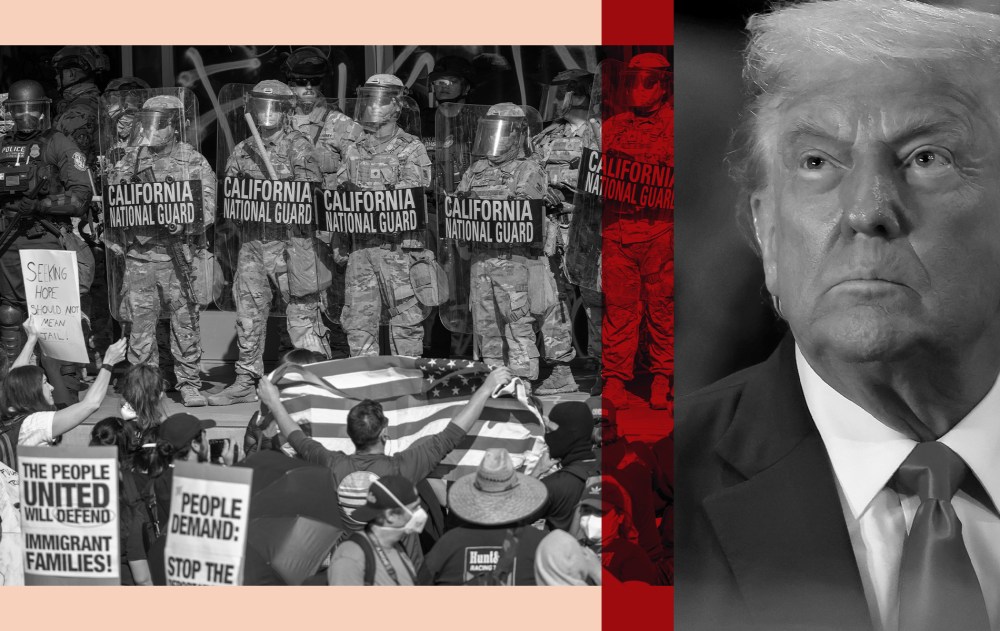

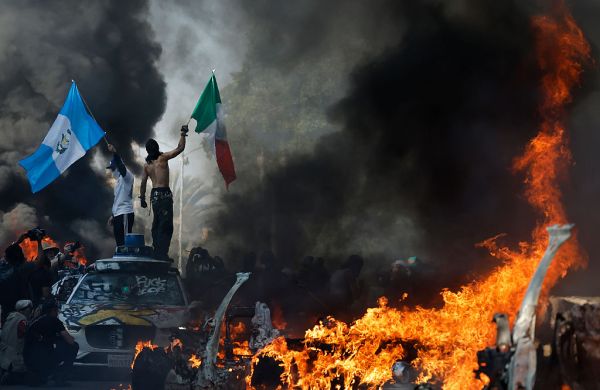
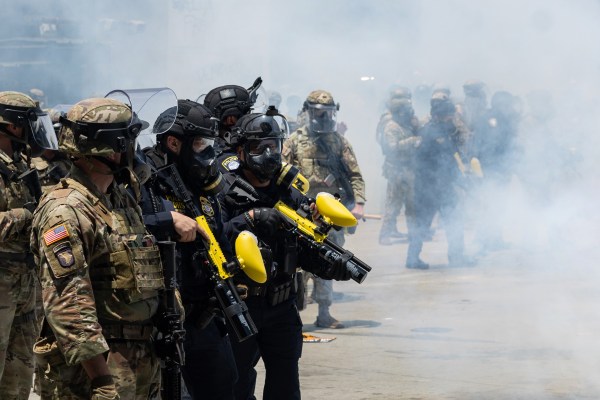
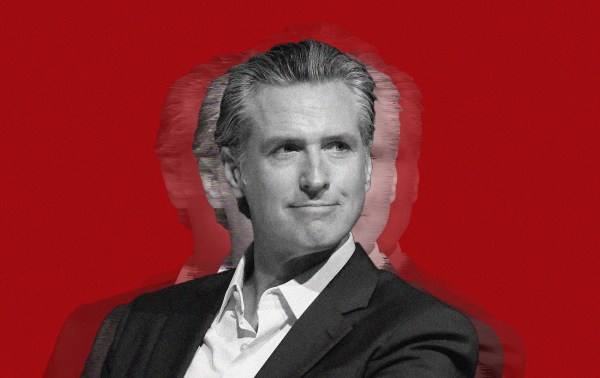

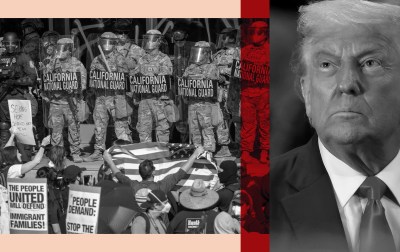
Please note that we at The Dispatch hold ourselves, our work, and our commenters to a higher standard than other places on the internet. We welcome comments that foster genuine debate or discussion—including comments critical of us or our work—but responses that include ad hominem attacks on fellow Dispatch members or are intended to stoke fear and anger may be moderated.
With your membership, you only have the ability to comment on The Morning Dispatch articles. Consider upgrading to join the conversation everywhere.